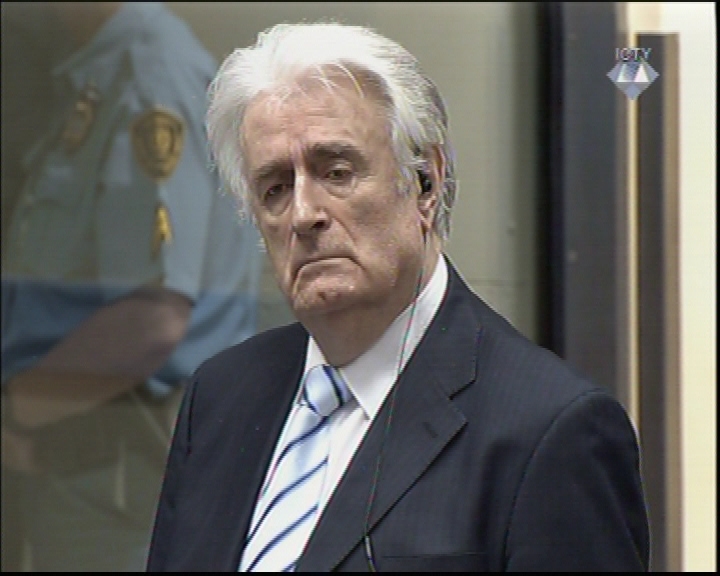Home
RADOVAN KARADZIC SENTENCED TO 40 YEARS IN PRISON
The former Republika Srpska president was found guilty of 10 out of a total of 11 counts in the indictment and was sentenced to 40 years prison. The Trial Chamber was not convinced beyond reasonable doubt that the crimes in the seven municipalities had been committed with the intent to commit genocide. The judges took Karadzic’s withdrawal from public functions in July 1996, the regret he had expressed and his good behavior in the detention unit as mitigating circumstances
 Radovan Karadžić during sentencing
Radovan Karadžić during sentencing Radovan Karadzic, former Republika Srpska president and supreme commander, was found guilty today of 10 out of the total of 11 counts in the indictment charging him with genocide, crimes against humanity and violations of laws and customs of war. The Trial Chamber sentenced Karadzic to 40 years in prison.
The allegation that the persecution of non-Serbs in seven BH municipalities: Bratunac, Foca, Kljuc, Prijedor, Sanski Most, Vlasenica and Zvornik, had reached the scale of genocide was the only count Karadzic was acquitted of.The Trial Chamber confirmed that grave crimes were committed after Serbs seized power in those municipalities, and that those crimes: extermination, murder, unlawful detention and forcible transfer of Bosnian Muslims and Croats, did indeed comprise the crime of genocide. Nevertheless, the judges did not find that those crimes had been committed with the intent to destroy those ethnic groups.
The judgment notes that Karadzic was involved in all four joint criminal enterprises: the ‘overarching’ joint criminal enterprise which included the common goal which was to ethnically cleanse large parts of the BH territory claimed by Bosnian Serbs, the artillery and sniper terror campaign in Sarajevo, taking UN staff hostages and genocide in Srebrenica. In all those enterprises, Karadzic played the key role, and was at the very top in the political, military and executive power, and he used his authority and power to implement the goals of the joint criminal enterprises. The accused, the Trial Chamber notes, played a vital role in formulating the policies of the Serbian Democratic Party. He was the key figure in the dissemination of fear, hatred and the idea that it was impossible for the ethnic communities in BH to live together.
The Trial Chamber rejected Karadzic’s defense that non-Serbs had left the territory under the control of the Serb forces voluntarily. Karadzic argued that it was a natural consequence of the war. Karadzic’s claims that the Sarajevo-Romanija Corps only responded to the fire from Sarajevo and that the BH Army had shelled their own people to provoke an international intervention were also dismissed. The Trial Chamber likewise rejected Karadzic’s argument that in May 1995 the UN staff were not hostages but prisoners of war because after NATO’s air strikes on the VRS positions the UN became a ‘warring party’.
Analyzing the role of the accused in the joint criminal enterprise in Srebrenica, the Trial Chamber took Karadzic’s Directive 7 from March 1995 as the starting point. In the document, Karadzic orders his underlings to ‘create an unbearable situation of total insecurity with no hope of further survival or life for the inhabitants of Srebrenica and Zepa’. The Trial Chamber found that the accused, together with Ratko Mladic, had drafted a plan for the permanent removal of the Muslims from the enclave. On 9 July 1995, Karadzic ordered the VRS troops to capture Srebrenica. On 13 July 1995 at 8 p.m., Karadzic spoke on the phone with Miroslav Deronjic, the man he had appointed civilian commissioner for Srebrenica; he ordered Deronjic to transfer thousands of detainees from Bratunac to the Zvornik territory and to hold them there. As of that moment, the judges decided, Karadzic accepted and shared the genocidal intent with Ratko Mladic, Vujadin Popovic, Ljubisa Beara and other participants in the genocide.
In sentencing, the Trial Chamber took into account the gravity of the crimes Karadzic was found guilty of, in particular genocide and extermination. On the other hand, the judges took in mitigation Karadzic’s withdrawal from political and public life in July 1996, his regret, his good behavior in the detention unit and his family circumstances.
Linked Reports
- Case : Karadzic
- 2016-03-20 KARADZIC'S „JUDGMENT DAY“
- 2016-02-18 RADOVAN KARADZIC JUDGMENT ON 24 MARCH
- 2015-12-09 KARADZIC WANTS STATUS CONFERENCE AND FRIDGE
- 2016-04-05 STATUS CONFERENCE ON KARADZIC’S MENTAL AND PHYSICAL HEALTH
- 2016-04-06 RADOVAN KARADZIC’S ‘CATALOGUE OF GENERAL COMPLAINTS’
- 2016-04-22 KARADZIC ASKS FOR PROVISIONAL RELEASE
